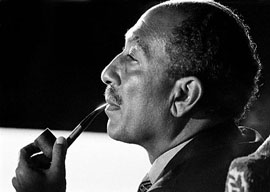
February 18, 2011

Anwar Sadat
The attack lasted 45 seconds. On the stand it was chaos. All the chairs were upside-down. People were crouched behind and under them. Many were dead or in shock. Around me, men shouted, “Al Rais, fein?” (The president, where is he?) I saw an officer clearing away the chairs, unhurt. It was Hosni Mubarak. I had to step over bodies in my search for Sadat. He, however, was gone.
That was the opening scene for President Mubarak’s relationship with his main political opposition, a moment you don”t forget when your predecessor is killed next to you.
As part of the Camp David agreement, the United States provides Egypt with military aid totaling over $1 billion a year and the civilian sector about $250 million. Where has all the money gone in 30 years? No one can point to a single school or hospital built with US foreign aid. But Egyptians can name the Abrams tank built in Egypt, the F-16s bought from the USA, and the tear-gas canisters made in Pennsylvania. Not fair criticism? Doesn”t matter; that’s how the Egyptian civilian population sees it. What they see is the explosion of a “nouveau riche” class under Mubarak’s rule.
Israel conveniently holds up the Muslim Brotherhood’s specter to apply pressure and enlist support for its crusade against Iran. Wrong appreciation of Egypt. The young educated are at the vanguard of this upheaval; the Muslim Brotherhood woke up one lap behind. It’s the educated, Internet-savvy generation that has shaken their fear of the “Mukhabarat,” the secret police under whom they have grown up. We”re not seeing poor, uneducated peasants from the countryside on Tahrir Square. This generation wants more freedom, and it is not about to let the Muslim Brotherhood hijack its movement. Neither will the military establishment, which doesn”t want American aid to vanish if Islamists take over the government. Still, for true democracy, the Muslim Brotherhood needs to be represented in parliament. The Islamists represent part of the population who are fed-up with the corruption they encounter at every level of the bureaucracy, as well as the poor quality of health and education for their children. If they sympathize with the Brotherhood now, that support can dissipate with more democracy.
With a population of 85 million, Egypt is still a village. All the people who matter know each other. In good families, home is where Arabic is spoken and you receive Islamic education. Children attend Catholic or foreign schools that offer better education than the state. They know more about us than we do about them. They speak several languages and understand our cultures. The Greeks, Italians, French, and Levantines are all intertwined in Egyptian families so that part of the Egyptian psyche is well anchored in Western culture. The Copts, the original Egyptian Christians who were there before the Arabs arrived in the seventh century, represent about 10 percent of the population.
Egyptians have a strong sense of history and identity. This is their revolution, and they do not want any outsiders deciding their future as happened under Mubarak. Young Egyptians want to shape their new government. This upheaval is the source of tremendous pride, which generates motivation and strength. The cards are being reshuffled in Egypt, though possibly not to the West’s liking.